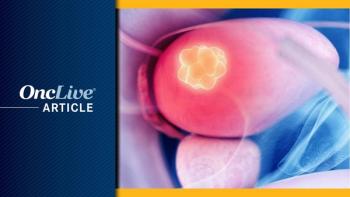
Select Biomarkers Signal Worse Survival Outcomes With Apalutamide/ADT in mCSPC
Circulating tumor DNA, select androgen receptor, and non-AR biomarkers have been identified as potential prognostic indicators of overall survival benefit for apalutamide plus androgen-deprivation therapy for patients with metastatic castration-sensitive prostate cancer.
Circulating tumor DNA (ctDNA), select androgen receptor (AR), and non-AR biomarkers have been identified as potential prognostic indicators of overall survival (OS) benefit for apalutamide (Erleada) plus androgen-deprivation therapy (ADT) for patients with metastatic castration-sensitive prostate cancer (mCSPC), according to an exploratory post hoc analysis of the phase 3 TITAN trial (NCT02489318), presented at the 2022 ASCO Annual Meeting.1
For the biomarker analysis, investigators used next-generation sequencing to analyze ctDNA and genomic aberrations in 17 prostate cancer–related genes at baseline (BL) and at end of study treatment (EOST). Baseline data were available for 114 patients and EOST data were available for 129 patients. Using statistical modeling, the investigators evaluated associations of ctDNA/aberrations detected at baseline and EOST with OS, as well as associations of ctDNA/aberrations detected at EOST with OS on subsequent therapies.
In a univariate analysis presence of ctDNA, any AR aberration, and PI3K pathway aberrations present at baseline and EOST were associated with significantly shorter OS. Specifically, at BL the associations were as follows:
- ctDNA (HR, 2.11; 95% CI, 1.37-3.32; P = .0006)
- any AR aberration (HR, 8.77; 95% CI, 4.16-18.50; P < .0001)
- PI3K pathway aberrations (HR, 1.30; 95% CI, 0.61-2.77; P = .5020)
At EOST these were:
- ctDNA (HR, 4.42; 95% CI, 2.44-8.01; P = .007)
- any AR aberration (HR, 1.99; 95% CI, 1.21-3.29; P = .007)
- PI3K pathway aberrations (HR, 2.03; 95% CI, 1.32-3.12; P = .0012)
Multivariate analyses baseline showed that ctDNA (HR, 1.92; 95% CI, 1.11-3.31; P = .0190) and any ARgenomic aberrations (HR, 6.68; 95% CI, 1.68-26.49; P = .0069) were significantly associated with poor OS. At EOST, any AR genomic aberration (HR, 1.65; 95% CI, 1.02-2.69; P = .0431) and PI3K pathway aberrations (HR, 2.23; 95% CI, 1.39-3.59; P = .0009) were associated with poor OS.
The investigators reported that the following aberrations occurred in at least 15% of the baseline population across both treatment arms: any genomic AR aberration, AR amplification, TP53,HRR pathway (BRCA1, BRCA2, FANCA, BRIP1, HDAC2, CDK12, ATM, PALB2, and CHEK2), RB1, PTEN, and PIK3CA.
“Detection of ctDNA or select AR and non-AR biomarkers at BL or end of study treatment [EOST] may be associated with worse survival [with apalutamide/ADT] among patients with mCSPC,” lead study author Neeraj Agarwal, MD, Huntsman Cancer Institute, and colleagues wrote in a poser of the data.
At baseline, 36% (41/114) of patients had detectable ctDNA, of which 27% (11/41) had any genomic AR aberration and 24% (10/41) had AR gene amplification. In this period from baseline to EOST, there was a significant increase in the presence of these biomarkers. At EOST, 75% (97/129) of patients had detectable ctDNA, of which 67% (65/97) had any genomic AR aberration and 63% (61/97) had AR gene amplification. All of these increases were statistically significant (P < .001 for EOST vs BL for all 3).
There was also an increase in the most prevalent non-AR aberrations at BL; however, none of these increases was statistically significant:
- TP53: 41% at baseline to 54% at EOST (P = .2 for EOST vs BL)
- HRR pathway: 22% to 27% (P = .5)
- RB1: 20% to 33% (P = .11)
- PTEN: 20% to 32% (P = .14)
- PIK3CA: 15% to 30% (P = .06)
The investigators also conducted univariate analyses of the population of patients who were treated with subsequent therapy, comprised of 106 patients who received chemotherapy and 161 patients who received hormonal therapy. Notable findings with this assessment was that among patients receiving chemotherapy, OS was worse among patients with PIK3CA activation (HR, 3.7; P < .05), PI3K pathway activation (HR, 2.4; P < .05), or TP53 inactivation (HR, 3.0; P < .01) at EOST.
In their poster summary, the authors noted, “The predictive value of these biomarkers for survival in mCSPC needs further confirmation.”
Reference
- Agarwal N, Lucas J, Aguilar-Bonavides C, et al. Genomic aberrations associated with overall survival (OS) in metastatic castration-sensitive prostate cancer (mCSPC) treated with apalutamide (APA) or placebo (PBO) plus androgen deprivation therapy (ADT) in TITAN. J Clin Oncol. 2022;40(suppl 16):5066. doi:10.1200/JCO.2022.40.16_suppl.5066



































